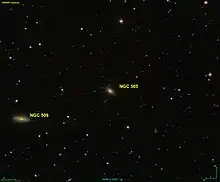| NGC 509 | |
|---|---|
 NGC 509 (SDSS) | |
| Observation data (J2000.0 epoch) | |
| Constellation | Pisces |
| Right ascension | 01h 23m 24.10s [1] |
| Declination | +09° 26′ 01.00″ [1] |
| Redshift | 0.007542 [1] |
| Heliocentric radial velocity | 2261 ± 5 km/s [1] |
| Distance | 87 Mly[1] |
| Apparent magnitude (V) | 13.70 [2] |
| Apparent magnitude (B) | 14.60 [2] |
| Characteristics | |
| Type | S0? [1] |
| Apparent size (V) | 1.6 x 0.6 [1] |
| Other designations | |
| UGC 932, MCG +01-04-045, PGC 5080 | |
NGC 509 is a lenticular galaxy approximately 87 million light-years away from Earth in the constellation of Pisces.[1] It was discovered by German astronomer Albert Marth on October 1, 1864.[3]
See also
References
- 1 2 3 4 5 6 7 8 "NASA/IPAC Extragalactic Database". ned.ipac.caltech.edu. Retrieved 28 November 2017.
- 1 2 "Revised NGC Data for NGC 509". spider.seds.org. Retrieved December 9, 2017.
- ↑ "Data for NGC 509". www.astronomy-mall.com. Retrieved December 9, 2017.
External links
 Media related to NGC 509 at Wikimedia Commons
Media related to NGC 509 at Wikimedia Commons- NGC 509 on WikiSky: DSS2, SDSS, GALEX, IRAS, Hydrogen α, X-Ray, Astrophoto, Sky Map, Articles and images
- SEDS
This article is issued from Wikipedia. The text is licensed under Creative Commons - Attribution - Sharealike. Additional terms may apply for the media files.
